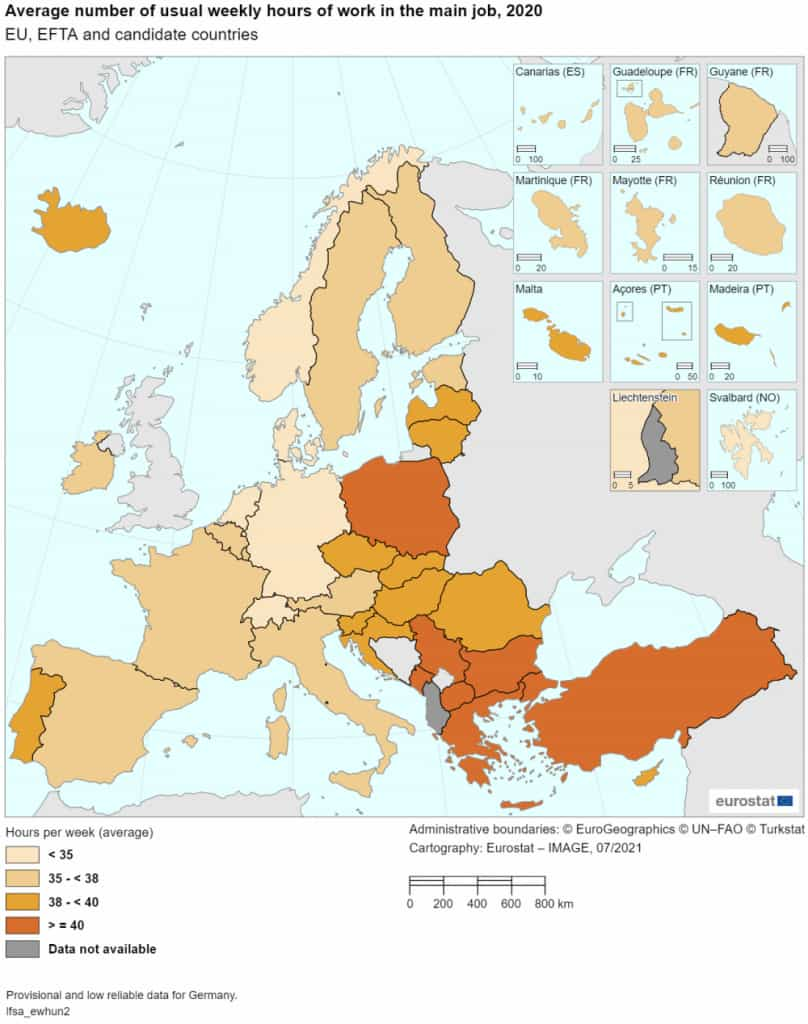What would you do with an extra free day per week? The 4-day working week has been a hot seat topic since the beginning of the pandemic and the outcome is not just a temporary compromise but a real amendment of work ethic.
The Great Resignation Issue
We all had to readjust our approach to work as soon as the Covid-19 emergency broke out, especially in terms of work-life/private-life balance. In 2021 more and more people resigned from their position fueling what has been called “The Great Resignation”. Companies register the highest rate of resignation since 2009, touching a peak in November of 4.5 million people in the US only.

As shown on the map above, differences in the number of hours spent at work are quite remarkable across the EU. Research made by the OMS with the International Labour Organization showed at least 488 million people work more than 55 hours per week, a rate that goes far beyond what is considered balanced and healthy.
There is obviously a spread difficulty to retain staff and recruit new workers and this emergency signal called for new measures to be introduced: flexible hours, higher wages, smart working and lastly, the reduced workweek.
Trial Tests
Not many have decided to experiment with the 4-day work week, however, some interesting results have come out by the few pioneers who decided to give a try to this new method.
In the UK, starting from the end of 2021, 30 companies have taken part in a trial test monitored both by internal and external supervisors. The formula is actually quite simple: same salary, same benefits, same leave time and same business goals. What changes is merely the number of hours on which work is spread, shifting from 5 business days to 4. In Italy, the challenge has been accepted by Carter & Benson who have been registering an increase in the quality of their services and staff productivity.
We should also take into account the incredible effects all of this could have on the environment: apparently, with only one day less per week, we could spare our planet around 127 million tons of CO2 per year.
On The Opposite Shore
Like any debate, we find the opponents to the 4-day work week waving some pretty legitimate claims against the revolution of the 9 to 5 system. Modern technology can indeed help implement the 4-day week for a wide range of business fields that can rely on artificial intelligence full time.
On the other hand, this might not be possible for other types of jobs, especially if they require direct contact with the public and the only way to overcome these issues might be a well-balanced rostering system, as it already happens in production, retail and customer service contexts.
From the companies point of view, staff costs could be a crucial issue as every worker actually costs more than their actual salary if we consider benefits of all kinds and pension contributions.

Yes, controversial issues always pop up when discussing such matters. However, it is time we consider new alternatives both to the standard work schemes and smart working because of which, in 2020, people actually lost the perception of what was work time and what was free time and led to spending around 10% more time at work than before.
Life as humans changes constantly and so we will as workers. In the 19th century, it was not that absurd to be working for 80 hours per week. As things have changed significantly since then we can expect a new turn in history, leaving workaholism behind and embracing all that can define us outside the work context. Work should be a way to self-establishment and dignity, a satisfying activity to be combined with a pleasant private life, and not just a dull, coin-spitting task.
A new way of clocking in
Say goodbye to the old clock & badge, with ZClockIn Zucchetti you can clock in at work by simply tapping on your phone

